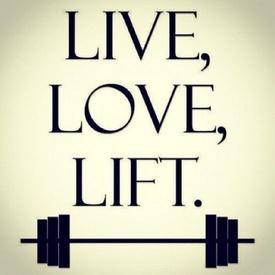The Biggest Loser Plan what you all wanted to know!!!

mrsyac2
Posts: 2,784 Member
Diet
With a formidable team of nutritionists and doctors, the Biggest Loser contestants have top-notch diet and nutrition information and tips. In an interview with MSNC, Dr. Michael Dansinger, a consultant on The Biggest Loser Season 2, explained “the people in the show are in a fantasy, unrealistic environment where everything is optimized for weight loss.” He notes that having nothing else to do working with a trainer makes it possible for participants to entirely reconfigure their diet and exercise routine.
Dansinger says that “50 to 60 percent of [contestants'] weight-loss success comes from dietary change.” The Biggest Loser contestants are used to consuming almost 3000 calories a day in their daily lives, but on the show they are consuming only about 1500 calories a day. Also, the trainers focus on substitution of sweets with sugar-free deserts and fruit and increasing contestant’s lean protein consumption in order to rev metabolisms.
Past contestants have revealed the following about their weight loss successes on the Biggest Loser in an interview from TvGuide.com:
~ “Eat 5-6 meals a day to your keep metabolism burning and never more than 2-3 hrs without food.”
~ “Eat protein at every meal and always couple carbs with protein because protein helps your body process carbs more efficiently.”
~ “Counting calories is key.”
~ “Don’t skip breakfast. It’s very important. You’ve got to get the motor running. I equate my body to an engine, and you’ve got to get that engine started first thing in the morning.”
~ “It’s all about choices. You can have a beef patty for 300 calories or substitute lean turkey at only 150 cal for the same 4 oz.”
Some of the diet advice the trainers, Bob and Kim, regularly emphasize is:
~ “Sit down at the dinner table when you eat; don’t stand up. People eat more when they’re standing up.”
~ “Make friends with fiber. Not only is it good for digestive health, it fills you up so you don’t get hungry as often.”
~ “Carry healthy snacks with you so that when you get hungry, you won’t cheat.”
~ “Make friends with fiber. Not only is it good for digestive health, it fills you up so you don’t get hungry as often.”
With the help of the show, the overweight contestants establish new healthy food relationships and learn about nutrition. And with such a restricted diet, it is no wonder the Biggest Loser participants shed such big numbers on the scale each week!
Fitness
So if 50 to 60 percent of the Biggest Losers weight loss success comes from diet, where is the other 40 to 50 percent coming from you ask? Through three to four hours of intense exercise every day, with at least an hour of strength training and two hours of cardio! This amount of activity allows the contents to burn an extra 1200 to 1500 calories, almost eclipsing the amount of calories they are taking in! Dansinger says. “It’s hard to do by yourself, but on the show it’s easy to do. When people allow themselves to be put in that kind of environment … when you pull out all the barriers to weight loss, that’s when the weight loss can come very quickly.”
With a formidable team of nutritionists and doctors, the Biggest Loser contestants have top-notch diet and nutrition information and tips. In an interview with MSNC, Dr. Michael Dansinger, a consultant on The Biggest Loser Season 2, explained “the people in the show are in a fantasy, unrealistic environment where everything is optimized for weight loss.” He notes that having nothing else to do working with a trainer makes it possible for participants to entirely reconfigure their diet and exercise routine.
Dansinger says that “50 to 60 percent of [contestants'] weight-loss success comes from dietary change.” The Biggest Loser contestants are used to consuming almost 3000 calories a day in their daily lives, but on the show they are consuming only about 1500 calories a day. Also, the trainers focus on substitution of sweets with sugar-free deserts and fruit and increasing contestant’s lean protein consumption in order to rev metabolisms.
Past contestants have revealed the following about their weight loss successes on the Biggest Loser in an interview from TvGuide.com:
~ “Eat 5-6 meals a day to your keep metabolism burning and never more than 2-3 hrs without food.”
~ “Eat protein at every meal and always couple carbs with protein because protein helps your body process carbs more efficiently.”
~ “Counting calories is key.”
~ “Don’t skip breakfast. It’s very important. You’ve got to get the motor running. I equate my body to an engine, and you’ve got to get that engine started first thing in the morning.”
~ “It’s all about choices. You can have a beef patty for 300 calories or substitute lean turkey at only 150 cal for the same 4 oz.”
Some of the diet advice the trainers, Bob and Kim, regularly emphasize is:
~ “Sit down at the dinner table when you eat; don’t stand up. People eat more when they’re standing up.”
~ “Make friends with fiber. Not only is it good for digestive health, it fills you up so you don’t get hungry as often.”
~ “Carry healthy snacks with you so that when you get hungry, you won’t cheat.”
~ “Make friends with fiber. Not only is it good for digestive health, it fills you up so you don’t get hungry as often.”
With the help of the show, the overweight contestants establish new healthy food relationships and learn about nutrition. And with such a restricted diet, it is no wonder the Biggest Loser participants shed such big numbers on the scale each week!
Fitness
So if 50 to 60 percent of the Biggest Losers weight loss success comes from diet, where is the other 40 to 50 percent coming from you ask? Through three to four hours of intense exercise every day, with at least an hour of strength training and two hours of cardio! This amount of activity allows the contents to burn an extra 1200 to 1500 calories, almost eclipsing the amount of calories they are taking in! Dansinger says. “It’s hard to do by yourself, but on the show it’s easy to do. When people allow themselves to be put in that kind of environment … when you pull out all the barriers to weight loss, that’s when the weight loss can come very quickly.”
0
Replies
-
Diet
With a formidable team of nutritionists and doctors, the Biggest Loser contestants have top-notch diet and nutrition information and tips. In an interview with MSNC, Dr. Michael Dansinger, a consultant on The Biggest Loser Season 2, explained “the people in the show are in a fantasy, unrealistic environment where everything is optimized for weight loss.” He notes that having nothing else to do working with a trainer makes it possible for participants to entirely reconfigure their diet and exercise routine.
Dansinger says that “50 to 60 percent of [contestants'] weight-loss success comes from dietary change.” The Biggest Loser contestants are used to consuming almost 3000 calories a day in their daily lives, but on the show they are consuming only about 1500 calories a day. Also, the trainers focus on substitution of sweets with sugar-free deserts and fruit and increasing contestant’s lean protein consumption in order to rev metabolisms.
Past contestants have revealed the following about their weight loss successes on the Biggest Loser in an interview from TvGuide.com:
~ “Eat 5-6 meals a day to your keep metabolism burning and never more than 2-3 hrs without food.”
~ “Eat protein at every meal and always couple carbs with protein because protein helps your body process carbs more efficiently.”
~ “Counting calories is key.”
~ “Don’t skip breakfast. It’s very important. You’ve got to get the motor running. I equate my body to an engine, and you’ve got to get that engine started first thing in the morning.”
~ “It’s all about choices. You can have a beef patty for 300 calories or substitute lean turkey at only 150 cal for the same 4 oz.”
Some of the diet advice the trainers, Bob and Kim, regularly emphasize is:
~ “Sit down at the dinner table when you eat; don’t stand up. People eat more when they’re standing up.”
~ “Make friends with fiber. Not only is it good for digestive health, it fills you up so you don’t get hungry as often.”
~ “Carry healthy snacks with you so that when you get hungry, you won’t cheat.”
~ “Make friends with fiber. Not only is it good for digestive health, it fills you up so you don’t get hungry as often.”
With the help of the show, the overweight contestants establish new healthy food relationships and learn about nutrition. And with such a restricted diet, it is no wonder the Biggest Loser participants shed such big numbers on the scale each week!
Fitness
So if 50 to 60 percent of the Biggest Losers weight loss success comes from diet, where is the other 40 to 50 percent coming from you ask? Through three to four hours of intense exercise every day, with at least an hour of strength training and two hours of cardio! This amount of activity allows the contents to burn an extra 1200 to 1500 calories, almost eclipsing the amount of calories they are taking in! Dansinger says. “It’s hard to do by yourself, but on the show it’s easy to do. When people allow themselves to be put in that kind of environment … when you pull out all the barriers to weight loss, that’s when the weight loss can come very quickly.”0 -
bump0
-
This amount of activity allows the contents to burn an extra 1200 to 1500 calories, almost eclipsing the amount of calories they are taking in!
So....they are not eating their exercise calories. And they continue to lose weight week after week without going into starvation mode. ?0 -
My wife and I thought about applying to be on the show. The only problem was that we were not able to work out who would take care of the kids, house, dog and bills while we were there.
This would require us to take an extended time off of work and result in no income to take care of things.
Kind of a bummer 0
0 -
This amount of activity allows the contents to burn an extra 1200 to 1500 calories, almost eclipsing the amount of calories they are taking in!
So....they are not eating their exercise calories. And they continue to lose weight week after week without going into starvation mode. ?
They are all morbidly obese, so they do this for two reasons:
1) They have ample body fat to provide energy even in a large deficit.
2) They are so overweight that the health risks of their obesity outweigh the risks of a depressed metabolism.
'Starvation' mode is really a misnomer. 'Depressed metabolism' is more accurate. Your cell turnover will slow down to match however much you're eating. You don't have to be starving for that to happen, and your weight loss will not necessarily stop. You can't help but lose fat in a 1200 calorie deficit, unless of course you have very little body fat. In that case you're losing muscle mass at an accelarated rate, which further decreases metabolic activity.0 -
Not all of the contestants are morbidly obese because if that were true I would be considered morbidy obese as well but this is my opinionThis amount of activity allows the contents to burn an extra 1200 to 1500 calories, almost eclipsing the amount of calories they are taking in!
So....they are not eating their exercise calories. And they continue to lose weight week after week without going into starvation mode. ?
They are all morbidly obese, so they do this for two reasons:
1) They have ample body fat to provide energy even in a large deficit.
2) They are so overweight that the health risks of their obesity outweigh the risks of a depressed metabolism.
'Starvation' mode is really a misnomer. 'Depressed metabolism' is more accurate. Your cell turnover will slow down to match however much you're eating. You don't have to be starving for that to happen, and your weight loss will not necessarily stop. You can't help but lose fat in a 1200 calorie deficit, unless of course you have very little body fat. In that case you're losing muscle mass at an accelarated rate, which further decreases metabolic activity.0 -
Not all of the contestants are morbidly obese because if that were true I would be considered morbidy obese as well but this is my opinionThis amount of activity allows the contents to burn an extra 1200 to 1500 calories, almost eclipsing the amount of calories they are taking in!
So....they are not eating their exercise calories. And they continue to lose weight week after week without going into starvation mode. ?
They are all morbidly obese, so they do this for two reasons:
1) They have ample body fat to provide energy even in a large deficit.
2) They are so overweight that the health risks of their obesity outweigh the risks of a depressed metabolism.
'Starvation' mode is really a misnomer. 'Depressed metabolism' is more accurate. Your cell turnover will slow down to match however much you're eating. You don't have to be starving for that to happen, and your weight loss will not necessarily stop. You can't help but lose fat in a 1200 calorie deficit, unless of course you have very little body fat. In that case you're losing muscle mass at an accelarated rate, which further decreases metabolic activity.
Mobidly obese is based off of your bmi.
a bmi of 30.0-34.9 is obese
anything over is morbid obese and over 40 is super obese
The people on the show are morbid- They have alot of weight to lose- They are not just "Overweight"0 -
Not all of the contestants are morbidly obese because if that were true I would be considered morbidy obese as well but this is my opinion
Morbid obesity is being at least 100 pounds overweight, with a BMI over 40. It's not a matter of opinion. It's a clinical definition.
songbyrdsweet is right. If you are morbidly obese, you aren't going to stop losing weight if your calories drop below a certain number.
The reasons not to drop below a certain calorie level without a doctor's supervision is because you risk not getting certain micronutrients which can make you malnourished. If you are under a doctor's supervision, they can keep an eye on the signs, order regular labs, etc. and that's less of an issue. That's why a lot of doctor supervised diets have their patients on 800 calorie a day instead of the mythical 1200 that most people use.0 -
Category BMI range - kg/m2
Starvation less than 14.9
Underweight from 15 to 18.4
Normal from 18.5 to 22.9
Overweight from 23 to 27.5
Obese from 27.6 to 40
Morbidly Obese greater than 40
This is the table the Wikipedia has in their definition of Body Mass Index for the calculations. The Biggest Loser Show I think only takes people who are morbidly obese for varying reasons - they need the most help and it is good for publicity - they can lose weight faster and have more dramatic results.0 -
Category BMI range - kg/m2
Starvation less than 14.9
Underweight from 15 to 18.4
Normal from 18.5 to 22.9
Overweight from 23 to 27.5
Obese from 27.6 to 40
Morbidly Obese greater than 40
This is the table the Wikipedia has in their definition of Body Mass Index for the calculations. The Biggest Loser Show I think only takes people who are morbidly obese for varying reasons - they need the most help and it is good for publicity - they can lose weight faster and have more dramatic results.
A woman with 33% body fat is considered obese as well so if they have higher percentage of fat then they would be morbid or super obese0 -
Well they should have no problem considering me for the program - the BMI calculator her at MFP says my BMI is 49.9.
THIS REALLY SUCKS AND I WANT TO DO SOMETHING ABOUT IT. :mad: :explode:
With my job duties it does not leave much time for anything else. So I have cut my calories down dramatically and starting to see a little difference. :happy:0 -
Well they should have no problem considering me for the program - the BMI calculator her at MFP says my BMI is 49.9.
THIS REALLY SUCKS AND I WANT TO DO SOMETHING ABOUT IT. :mad: :explode:
With my job duties it does not leave much time for anything else. So I have cut my calories down dramatically and starting to see a little difference. :happy:
Thats good that you want to do something don't lose focus-0 -
bumping for afternoon/evening viewers0
-
Wikipedia is wrong. I'm shocked! :laugh: Okay, not really. Now I have to decide if I care enough to go edit the article... probably not.Category BMI range - kg/m2
Starvation less than 14.9
Underweight from 15 to 18.4
Normal from 18.5 to 22.9
Overweight from 23 to 27.5
Obese from 27.6 to 40
Morbidly Obese greater than 40
This is the table the Wikipedia has in their definition of Body Mass Index for the calculations.
From http://www.consumer.gov/weightloss/bmi.htm
Normal BMI is 18.5 to 24.9
Overweight 25 to 29.9
Obese 30 to 39.0
Morbidly Obese: 40+0 -
that is good article thanks for sharing that.0
-
Wikipedia is wrong. I'm shocked! :laugh: Okay, not really. Now I have to decide if I care enough to go edit the article... probably not.Category BMI range - kg/m2
Starvation less than 14.9
Underweight from 15 to 18.4
Normal from 18.5 to 22.9
Overweight from 23 to 27.5
Obese from 27.6 to 40
Morbidly Obese greater than 40
This is the table the Wikipedia has in their definition of Body Mass Index for the calculations.
From http://www.consumer.gov/weightloss/bmi.htm
Normal BMI is 18.5 to 24.9
Overweight 25 to 29.9
Obese 30 to 39.0
Morbidly Obese: 40+
Well, in relation to this thread they are in agreement on the morbidly obese being 40+. :happy: Though one source I checked considered 36 - 40 or so to be morbidly obese and anything over 40 was super obese. But I noticed that the 5 or so tables I looked at, some had a little variation, but 2 or 3 were about the same as the Wikipedia one. I think the one you found is like the one used in the bmi calculator here. 0
I think the one you found is like the one used in the bmi calculator here. 0 -
Sorry for my comment earlier I didn't know it would upset anyone.:flowerforyou:0
-
Sorry for my comment earlier I didn't know it would upset anyone.:flowerforyou:
:huh: Who's upset? I don't think anyone was upset. Just stating facts is all :flowerforyou: 's o.k. :happy:0 -
I don't see anyone upset just educating thats all-0
-
Sorry for my comment earlier I didn't know it would upset anyone.:flowerforyou:
I didn't mean to offend you. I was using it in only as a clinical definition. I don't mean to diagnose anyone here or make them feel uncomfortable. :flowerforyou:0 -
Just saying sorry cause i thought i offended you all.0
-
It takes a lot more than that to offend most of us :flowerforyou: Granted, there seem to be some that are easily offended, but those of us that replied to your post generally are not - hopefully you understood our posts in the manner they were intended. Just the facts ma'am, just the facts :laugh: You're o.k. with me, hope I'm o.k. with you
 0
0 -
Im not offended- it takes alot more to offend me-All is good this way0
-
I think the point is -
this is really good info for lots of reasons:
1. BL contestants are living in a dream (nightmare) situation.
2. They are extremely overweight, eating 1500 calories & working out 3-4 hours/day.
Tough conditions to recreate, but we can learn from their experiences anyway.
Thanks for sharing this.0 -
The extreme is that they workout for so long- But they are able to do that because they eat sleep and workout thats it- no phone, no work, no kids, no housework, no errands, no distractions-0
-
Sorry for my comment earlier I didn't know it would upset anyone.:flowerforyou:
nobody's upset, you're as entitled to an opinion as anyone else. But yes, morbidly obese is a BMI of higher than 40. it's just a classification though, you're here trying to lose weight, and succeeding rather triumphantly if I might add- so what if you fit into that classification? you're changing yourself and that's what matters. :flowerforyou:0 -
Awe thank you for that comment:happy:Sorry for my comment earlier I didn't know it would upset anyone.:flowerforyou:
nobody's upset, you're as entitled to an opinion as anyone else. But yes, morbidly obese is a BMI of higher than 40. it's just a classification though, you're here trying to lose weight, and succeeding rather triumphantly if I might add- so what if you fit into that classification? you're changing yourself and that's what matters. :flowerforyou: 0
0
This discussion has been closed.
Categories
- All Categories
- 1.4M Health, Wellness and Goals
- 394.8K Introduce Yourself
- 44K Getting Started
- 260.6K Health and Weight Loss
- 176.2K Food and Nutrition
- 47.5K Recipes
- 232.7K Fitness and Exercise
- 444 Sleep, Mindfulness and Overall Wellness
- 6.5K Goal: Maintaining Weight
- 8.6K Goal: Gaining Weight and Body Building
- 153.2K Motivation and Support
- 8.2K Challenges
- 1.3K Debate Club
- 96.4K Chit-Chat
- 2.5K Fun and Games
- 4.1K MyFitnessPal Information
- 16 News and Announcements
- 1.3K Feature Suggestions and Ideas
- 2.8K MyFitnessPal Tech Support Questions









